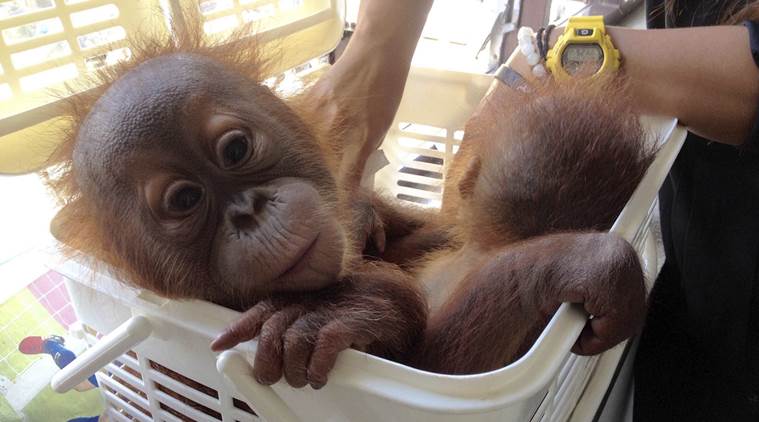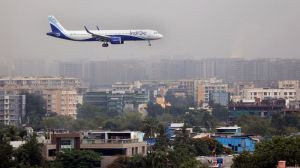Stay updated with the latest - Click here to follow us on Instagram
Thailand: Baby orangutans rescued in police sting
An anonymous tip alerted police to an online advertisement for the endangered animals, who are less than one year old and the size of infants.
 Two baby orangutans sit in a basket after they was rescued in Bangkok, Thailand, on Thursday. (Source: AP)
Two baby orangutans sit in a basket after they was rescued in Bangkok, Thailand, on Thursday. (Source: AP)
Thai police rescued two baby orangutans in a sting operation after undercover officers arranged to buy the primates over a mobile phone messaging app from wildlife traffickers for nearly USD 20,000, officials said. An anonymous tip alerted police to an online advertisement for the endangered animals, who are less than one year old and the size of infants.
Police then posed as interested buyers and contacted the seller over WhatsApp, according to deputy national park director Adisorn Noochdumrong. “They agreed to buy the two orangutans for 700,000 baht (USD 19,400) and transferred a 100,000 baht down payment to a bank account that belongs to a Thai man,” he told media.
Watch What Else Is Making News:
The undercover officers arranged to pick up the baby apes outside a Bangkok supermarket on December 21, where the orange-furred creatures were delivered by a city taxi driver.
The driver was arrested but cleared after authorities determined he was not part of the smuggling gang, according to wildlife police officer Anothorn Srithongbai. “As far as the real trafficker goes, that’s still under investigation,” he added.
Orangutans are native to Malaysia and Indonesia but they are often illegally smuggled throughout Southeast Asia, either for private zoos or as pets.
Thailand has long served as a transit hub for contraband wildlife products bound for major markets like Vietnam and China. Counter-trafficking organisation Freeland, which assisted with the orangutan rescue, said the attempted sale was linked to a “major regional criminal syndicate” involved in the lucrative illegal wildlife trade.
Social media has become an integral tool for such gangs to set up sales, said Matthew Pritchett from Freeland. “This case is one link in a much larger chain,” he added.
- 01
- 02
- 03
- 04
- 05































